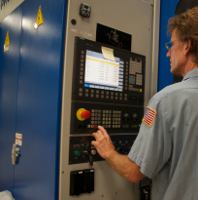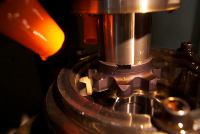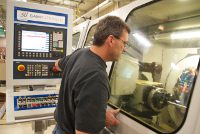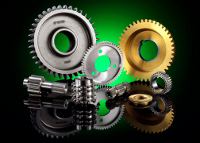Roscoe, IL is home to many more gear companies than your average town of 10,000 people, but the reason is obvious. During the peak of the machine tool boom in nearby Rockford, it was critical to have these important components made locally. Over the years, that market has changed and so have the gear companies here, each taking its expertise in other directions to offset the decline in local machine tool building.
Forest City Gear Inc. took a different track to remain competitive globally.

"We decided long ago to do two things," explains Fred Young, CEO of the company, which was founded in 1955. "First, to make the very best fine and medium coarse pitch gears in the world, and to do so by using the best machines, people, and quality assessment practices possible. Second and just as important, we became committed to reinvesting our company's profits in newer and better machinery, based on the global standards and the ongoing technical advancements made by machine tool builders around the world."
Keeping Production In-House
This precision gear and spline maker performs nearly every aspect of production in-house, including blanking, turning, hobbing, shaping, milling, gear grinding with form wheels and generating grinding, thread grinding, broaching, honing, straightening, laser marking, magnetic particle inspection, metal-etching, CMM, hardness testing, and final surface inspection. Forest City Gear continues to subcontract heat treating and plating. The blanking department, though relatively new, has been expanded several times to keep pace with increasing production.

The company boasts nearly every leading brand of gearmaking machine tool on the world market, because, as Young puts it, "We really do put our money where our mouth is, to use that old expression. In a typical year, we invest between 25 and 40% of our gross sales back into better gear machines and metrology."
Among the most advanced gearmaking machines in this shop are four Gleason shapers, two Samputensili grinders (form and generating style) plus a Hoefler gear grinder. All these machines have something in common.

At the heart of any machine tool, of course, is the CNC that drives it, controls the motion, detects and integrates all the cutting parameters, feeding back that information to the computer logic of the control to ensure the part being made is as close as possible to the programmed specifications. Meanwhile, the ergonomic or operator-to-machine interaction must always be considered, because a control that's too difficult to learn and use will result in substantial and costly delays in production.
Advanced Equipment Key to Excellence
While Forest City Gear has the classic mix of longtime and newer employees, who all bring a variety of computer knowledge and machining skills to the job, this company has consistently sought the most advanced equipment on the market, as part of its "Excellence Without Exception" motto and its practical desire to stay ahead of the competition in the global gear market.

The control on these machines at Forest City Gear is the Sinumerik 840D from Siemens with specialized gear software.
"The extensive gear software developments available are quite remarkable," explains Young. "Most have been a cooperative venture between a machine builder, the CNC builder, and folks like us. The result has been software that's specific to hobbing, shaping, gear grinding, and thread grinding."
He also notes features of the Siemens CNC that have yielded positive impacts on the production at Forest City Gear, including "…sophisticated executive software for all machine movements and the fast program reading that allow us to cut and grind much faster, with more options such as reverse direction, segment cutting and combined operations, when compared to other controls we see."
Typically, the CNC is used for all axis, rotary, and spindle movements and the machine operators particularly appreciate the multiple standard cycles for cutting with degressive feeds, increasing speeds plus special cycles for gear tooth removal and reversing directions to improve finish or reduce cutter wear.
Wide Variety of Materials
Forest City Gear cuts a wide variety of standard and exotic materials in the production of its gears and splines, including titanium, Inconel, 4340, 300M, Vascomax 250 and 300, Nitralloy 135M, 9310, 4150, 4140, 8620, aluminum bronze, 13-8, 15-5, 17-4, 316 and 440 stainless, Hastelloy, Ferrium, and numerous thermoplastics. The shop can carbide rehob to 60-62 RC and gear grind at all hardnesses.
Kevin Chatfield, a longtime Forest City Gear employee with 20 years' CNC machine experience, works with the Samputensili grinders.
"I've used all the brands of controls we have here… and for many jobs, no other control can do what the Siemens 840D can do," he says. "One example would be the internal, external, and form-grinding I do on the Samputensili machine. If the other controls could perform these operations at all, which is doubtful, it would be a very slow process."
Mark Cunningham, a 12-year veteran of CNC, runs the Gleason machines and notes the controls are very user-friendly.
"The screens are easy-to-program and modify, then you get a clear picture of what's happening at every step in the cycle," Cunningham says. "The precision is so good, we sometimes need to 'lie' to the program to get what we want from the machine."
Brian Turnbull, a newcomer to Forest City Gear, but a longtime machinist, had worked with a competing brand to Siemens CNC and was initially hesitant.
"Then, as soon as I saw the easy layout, plus how quickly it could be set up and go into action, with no trouble navigating at all, I was convinced Siemens was simply a better control," he says.
Young notes one last point about the CNCs on these machines.
"These machine tools produce our most complex parts, including helical splines and internal gears most other shops simply cannot or will not make. The cycle and program read times on the Siemens controls are critical to our production work, plus these are the most expensive machines in the shop, so their run-time cost is the highest." He adds, "Most of our jobs, though not all, here are short runs on very expensive materials. If the machine takes too long to complete the first part or has repeat rejects, we lose money — it's that simple. I'm proud to say that neither our operators nor our production supervisors allow that to happen. And the controls on the machines are a big reason why we stay so successful in achieving that accuracy and consistently good part production at Forest City Gear."
The company has remained among the leaders in the market for high-precision gears, owing to this strategy of buying the best machines, hiring the best gearmakers available, and verifying the output of this 100-person shop by using the power of the industry's leading quality lab, which occupies a cleanroom-level environment in the middle of the factory.
"We do checking of our gears and splines at various test stations located throughout the shop, but the final proof resides in our quality lab," Young explains. "Our equipment is so sophisticated, even our competitors often bring us their work to have it checked. It's one of the things that's led to our current customer base of about 400 companies, about 20% of whom are other gear companies or gear producers themselves."





